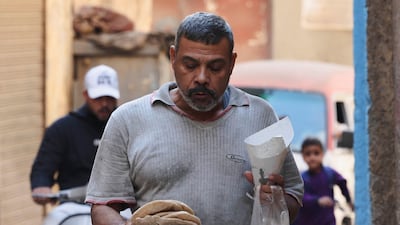The Egyptian government says the economy may have turned a corner, forecasting lower inflation, respectable growth and reduced indebtedness, but experts and commentators insist only a major shift in policy will guarantee enduring recovery and better resistance to future financial shocks.
Criticism of the government’s handling of the economy has not been without political undertones given that President Abdel Fattah El Sisi is the architect of the nation's economic policies, with an attention to detail not demonstrated by any of his predecessors.
“The problem has been and still is the economic management and policies that brought us to this situation,” said Ziad Bahaa Eldin, a former deputy prime minister and a widely respected economist. “Therefore, what we should concern ourselves with now is how to tackle the chronic problems that have pushed us into the latest crisis so that it doesn't reoccur, perhaps more deeply.”
Egypt – the most populous Arab nation, with 107 million people – was inching close to insolvency early this year, with a shortage of foreign currency, inflation near 40 per cent and a currency with declining value.
But the country secured a bailout in the amount of $60 billion – including an $8-billion loan from the International Monetary Fund – in February and March.
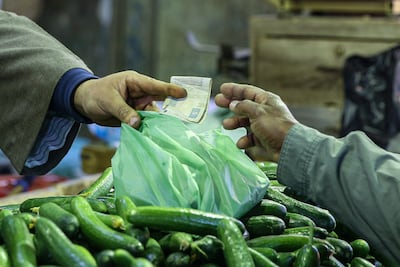
Mr Bahaa-Eldin does not believe that Covid-19 and the fallout from the wars in Ukraine, Gaza and Lebanon were alone responsible for the crisis and maintains that policies at home made the impact of these external factors significantly worse.
“These policies doubled their impact on us and made our economy more vulnerable and less prepared to adapt,” said Mr Bahaa-Eldin. “These policies were rooted in the expansion of the state’s intervention in all economic activity, more foreign domestic borrowing, and the simultaneous undertaking of a large number of national projects.”
Neither Mr El Sisi, Egypt’s leader of 10 years, nor Prime Minister Mostafa Madbouly have publicly acknowledged that policies at home might have had something to do with the crisis. They also pushed on with mega projects like a new, $60-billion capital in the desert east of Cairo, costly modern transport modes, as well as borrowing.
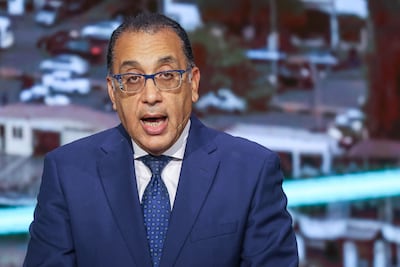
“Despite the economic challenges … we have nevertheless adhered to our goals,” Mr El Sisi recently said. “Crises offer real opportunities and genuine successes in dealing with the challenges they pose,” said Mr El Sisi, a former army general.
The president also delivered a message to Egyptians late last month in which he likened conditions in the country to the period of gloom and despair after Egypt’s defeat by Israel in the 1967 Middle East war.
Many interpreted the analogy to mean that Egyptians will have to expect more economic hardships before life becomes easier.
“It is imperative that the crisis is publicly acknowledged as a prerequisite to dealing with it provided that all the facts are presented to the people so it is possible to ask them to make more sacrifices than they had already made and show more patience than they had already shown,” said veteran political analyst Abdalla Al Senawy.
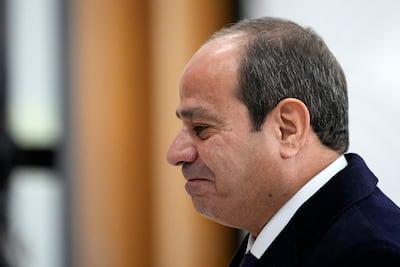
Egypt has devalued its currency four times since early 2022, with the last one in March shaving 40 per cent of its value against the US dollar.
The country has also experienced a crunch of foreign currency. Inflation has been in double digits, standing at around 26 per cent now, but down from an all-time high of 37 per cent in September last year.
Mr Madbouly has strongly suggested that the crisis may be close to an end and last week he cited some significantly improved indicators.
“We will not be taking any more measures in the coming period that will increase the cost-of-living burden on citizens,” he told reporters on the eve of a two-week review this month by an IMF mission to verify his government’s compliance with the agency’s conditions for the $8 billion dollar loan.
He forecast growth in the current fiscal year (July 1, 2024-June 30, 2025) at 4 per cent or more. Inflation, he added, will hover around 16 or 17 per cent by the end of the current fiscal year and at 10 per cent by the end of the next one.
Remittances by Egyptian expatriates, a major source of foreign currency, registered $2.6 billion in August, up from $1.6 billion in the same month last year, Mr Madbouly said last week.
The national debt, he continued, was expected to drop to less than 85 per cent of GDP this fiscal year, down from 89.6 per cent in the previous 12 months and 96 per cent the year before. Reliance on new and renewable energy, a key and politically sensitive sector, will rise to 42 per cent of the country's energy needs by 2030, he added.
Much of the prime minister's positive forecasts proved not to be a pipe dream when Fitch Ratings this month upgraded Egypt's long-term foreign-currency Issuer Default Rating (IDR) from 'B-' to 'B' with a stable outlook, citing an increase in international reserves and a recovery in the net foreign asset position.
Also, the signs of recovery were not overlooked by Amr Adeeb, a popular talk show host and often a sharp critic of the government's economic policies.
"Egypt can now catch its breath, economically. We are at a point where there's strong desire by the Egyptian administration never to go back to the crisis point," he said on the Saudi-owned network MBC Egypt.
"We are no longer out of breath or under the knife. May God never return us to those dark days."
Egyptians endured three steep hikes in fuel prices this year, the latest of which, in October, was by up to 17 per cent. That hike spurred a dramatic surge in prices. It followed large increases in the price of subsidised bread – a staple for more than 70 million Egyptians – and electricity.
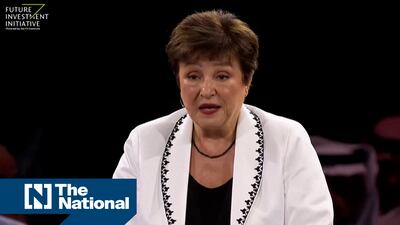
The latest spike in fuel prices prompted Mr El Sisi to publicly urge the IMF to revise down its prescribed reforms and timeline so as not to deepen the struggle by many to make ends meet. But IMF chief Kristalina Georgieva publicly disagreed with the President and his Prime Minister during a visit to Cairo early this month, insisting that economic reform was the only route to recovery.
She said she understood the strains put on Egypt because of the revenue losses as a result of the Gaza war but did not recognise them as significant enough challenges to justify a change in the fund’s mandated reforms, as the government requested.
“The IMF programme was finalised in March when the war in Gaza was entering its sixth month and its effects on the Suez Canal had made themselves abundantly clear. If the fund did not put the war in mind then, it’s unlikely that it will do so now,” she said.
Ms Georgieva, on the other hand, recognised some improvement in economic indicators, including declining inflation, rising foreign currency reserves and the gradual shift from an in-kind subsidy system to a cash-based alternative.
However, those improvements seem to have barely made a change to most Egyptians, who have been paying more for their food and utilities since 2016 while inflation wiped out more of the value of their earnings.
“The head of a household with two or three children and who provides them with breakfast, lunch and dinner 365 days a year is a national hero, even if that was all he provides them with,” wrote Anwar El Hawary, a political analyst and an outspoken critic of the government.
“Those three meals are now the real battle in all Egyptian households,” he wrote on Facebook.

Some businessmen are not too optimistic about the economy, despite the government's assurances that there is now light at the end of the tunnel.
“The situation remains a little foggy, and many businessmen are frustrated,” said a prominent industrialist who spoke on condition of anonymity. “My clients’ purchasing power of materials I produce has declined because their goods are too expensive for nearly everyone, so their sales are down.
“The role of the state in the economy is also increasing, not decreasing, and we expect the [Egyptian] pound’s value to be significantly down by the year’s end or the first quarter of 2025.”
